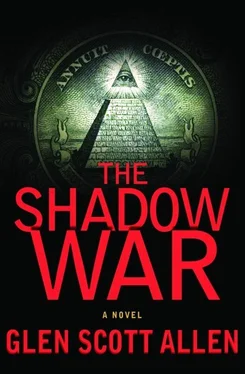Glen Allen - The shadow war
Здесь есть возможность читать онлайн «Glen Allen - The shadow war» весь текст электронной книги совершенно бесплатно (целиком полную версию без сокращений). В некоторых случаях можно слушать аудио, скачать через торрент в формате fb2 и присутствует краткое содержание. Жанр: Триллер, на английском языке. Описание произведения, (предисловие) а так же отзывы посетителей доступны на портале библиотеки ЛибКат.
- Название:The shadow war
- Автор:
- Жанр:
- Год:неизвестен
- ISBN:нет данных
- Рейтинг книги:5 / 5. Голосов: 1
-
Избранное:Добавить в избранное
- Отзывы:
-
Ваша оценка:
- 100
- 1
- 2
- 3
- 4
- 5
The shadow war: краткое содержание, описание и аннотация
Предлагаем к чтению аннотацию, описание, краткое содержание или предисловие (зависит от того, что написал сам автор книги «The shadow war»). Если вы не нашли необходимую информацию о книге — напишите в комментариях, мы постараемся отыскать её.
The shadow war — читать онлайн бесплатно полную книгу (весь текст) целиком
Ниже представлен текст книги, разбитый по страницам. Система сохранения места последней прочитанной страницы, позволяет с удобством читать онлайн бесплатно книгу «The shadow war», без необходимости каждый раз заново искать на чём Вы остановились. Поставьте закладку, и сможете в любой момент перейти на страницу, на которой закончили чтение.
Интервал:
Закладка:
Benjamin laughed. And so through the rest of the meal it was Benjamin's turn to tell Natalya stories of his childhood: growing up in upstate New York, the son of another "academician" (using Natalya's term), an historian from a long line of historians. "My father used to tell terrible jokes," he said. "He would say, 'History has quite a long history in this family.' " Benjamin smiled. "We would all groan, but he didn't care. He was a very carefree person, for the most part."
"For the most part?"
"There was one subject that would make him go almost nuclear, as we used to say, and that was when he felt someone was exploiting the Founding Fathers to justify intolerance. He thought it was an insult to the Constitution, to everything they'd fought so hard to achieve. 'Don't they understand?' he'd say. 'The whole point was to have the freedom to piss each other off!' "
Natalya laughed. "I think I would have liked your father," she said. "And I believe you will like my father."
Benjamin looked up, raised his glass again. "Then let's toast to new friends," he said. They tapped glasses.
After dinner, they walked back to the hotel, sticking to the boulevard along the bay. Both of them knew they were trying to extend their little fantasy "honeymoon" as long as possible, to put off the moment when they would have to face the reason they were here.
Once back at the InterContinental, Benjamin immediately opened the French doors to the balcony, went outside, and stood, leaning on the railing and looking out over the ocean. Natalya came out and stood next to him.
"I don't know how to thank you," she said.
"No," he said, "I should be the one-"
Natalya put her hand to his face, turned it to hers. She looked at him for what seemed an eternity before she finally leaned very close and pressed her lips against his. Benjamin put his arm around her waist, pulled her against him, moved his lips from her mouth to her neck.
"Benjamin," Natalya said. Then, very gently, she pulled away from him. She put her hands on his shoulders. "I am sorry," she said. "I just do not think-"
"It's all right," Benjamin said. He was still holding her waist but he made no attempt to draw her close again. "I understand."
"And we need to rise early," Natalya said.
"Yes, we do," Benjamin said. But he was still holding her.
She took his hands, one in each of hers, and moved them apart. Then, without another word, she went back into the room, entered the bathroom.
After that, they wished each other a friendly good night-though it sounded slightly more awkward now than it had in Nice-and went to their separate beds. Once again, Benjamin was sure he wouldn't be able to sleep. Once again, as soon as his eyes were closed, he was fast asleep.
Suddenly Benjamin woke up. He was certain someone was standing over him.
Dim moonlight was coming through the open balcony doors. He could see Natalya above him.
She was naked, her pale skin almost shining in the moonlight. Without a word, she lifted the covers from his bed and crawled underneath them. She pressed her lips to his cheek, his mouth, his neck; her hand traced down his chest, across his stomach, lower.
Benjamin rolled so he was facing her, pressed against her, returned her kisses. He felt himself clearly, sharply awake, and yet wondered whether this wasn't all a dream.
A very wonderful dream.
They made love slowly, without speaking. It was as if a reserve of tenderness, held at bay through the anxious maneuvers of the last couple of days, was suddenly released. When they looked into each other's eyes, they both saw trust and compassion there. Benjamin felt he had never experienced an intimacy so consuming, so deep.
Afterward, they lay for a long while in each other's arms, Natalya's head resting on his shoulder. Finally, Benjamin said something that had been on his mind ever since they'd arrived in Nice.
"Natalya," he said, "I have something to say."
She snuggled closer to him. "You don't have to say anything," she said.
"No, this I do," he said. He turned and faced her.
"What if you were simply to stay here? Whatever will happen in Russia… well, it is my adventure, as you called it. I should see it through alone. You could write an introduction for me to your father, and…"
"Benjamin," she interrupted. "There is another story about the Russian Revolution and Nice I did not tell you earlier. There was a very famous Bolshevik, Raskolnikov. He was completely loyal to the Party, one of those who put down the sailor's mutiny at Kronstadt. But even he lost faith during the Moscow show trials in the thirties. He fled here to Nice. He lived there seven years, and finally thought he was safe. But Comrade Stalin's agents found Raskolnikov in 1939. Even this paradise was not far enough away from such people."
"Stalin is long dead," Benjamin objected.
"But these people, whoever they are," she said, finally looking up at him, "they might be just as terrible. Such people do not simply forget, Benjamin. If we truly have something they want, or know something they do not want us to know, they will not leave us alone. Believe me," she said, looking into his eyes, "I have known such people. Power is more important to them than anything. Our only hope is to find the truth."
Benjamin looked at her for a moment, then smiled and pulled her close.
"Ah, Mrs. Levebre," he said. "I have a feeling I will not win many arguments with you."
Natalya held him tighter. After a while, she could hear Benjamin's regular breathing as he lay sleeping, but for a long time she lay wide awake, staring out the window at the brightening dawn sky.
CHAPTER 41
Benjamin looked out of the train window at the passing countryside. As they'd left Moscow, the land had grown flatter and less densely populated, and the monotonous, square, gray rectangles of Soviet-era Moscow architecture had given way to the villages of small, haphazard dachas that studded the land between Moscow and Dubna. The closer they got to Dubna, the thicker grew the forests of pine trees.
On the short flight from Nice, and all during the train ride to Dubna, Natalya had said nothing about what had happened the night before. If anything, she seemed more distant than ever. Benjamin wrote it off to her concerns about her father and, for that matter, concerns about their entire adventure here.
Perhaps because of this, or some other reason Benjamin couldn't fathom, much of their trip to Dubna was spent in silence; watching the passing landscape, making small talk about his impressions of Russia, each of them trying not to appear too anxious for the sake of the other's feelings.
Along the train tracks there were stretches of undeveloped forest and of wild land that he thought probably hadn't changed in hundreds of years. There was also the sense of enormous potential, of great power and pride in the land itself, of immense history and possibility. He said something of this to Natalya.
"Yes," she agreed. "That is the Russia no Russian ever truly leaves. My father used to say we inhale Russian history with our every breath, that it is in our blood. It isn't until I return that I remember what that means."
Finally they pulled into the station in Dubna. It was the last stop on the line and so everyone exited the train. There was a light rain falling, and the air was chill with a premonition of frost and perhaps snow.
As they left their car, Benjamin saw a large monument at the front of the platform: a huge red star with an arc over its top and, and in another arc on the bottom, the English words ATOMIC CITY. He asked her what it meant.
"This is where they created the Russian atomic bomb," she said. "For many years, Dubna was like Uzhur, a secret city. Before 1956, it did not even exist on any map. Of course, there was the old Dubna-some say a settlement here dates back thousands of years. But the new Dubna was built by prisoners under the NKVD's control during the war."
Читать дальшеИнтервал:
Закладка:
Похожие книги на «The shadow war»
Представляем Вашему вниманию похожие книги на «The shadow war» списком для выбора. Мы отобрали схожую по названию и смыслу литературу в надежде предоставить читателям больше вариантов отыскать новые, интересные, ещё непрочитанные произведения.
Обсуждение, отзывы о книге «The shadow war» и просто собственные мнения читателей. Оставьте ваши комментарии, напишите, что Вы думаете о произведении, его смысле или главных героях. Укажите что конкретно понравилось, а что нет, и почему Вы так считаете.












